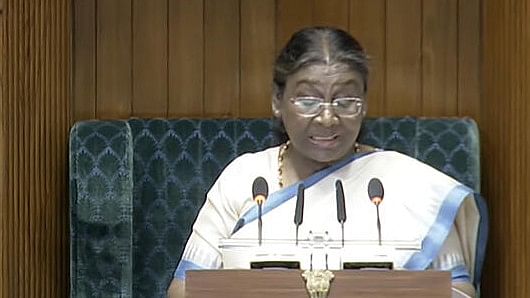
President Droupadi Murmu addresses the joint sitting of the Lok Sabha and Rajya Sabha, in New Delhi.
Credit: PTI Photo
New Delhi: President Droupadi Murmu on Thursday stressed the government's unwavering faith in the Constitution and efforts to make it a part of 'public consciousness', while slamming the Emergency as the 'biggest and darkest chapter of direct attack' on the Constitution.
In her first address to a joint sitting of Lok Sabha and Rajya Sabha after Prime Minister Narendra Modi began his third term, she described the poll result as an endorsement of his government's policies while ruing attempts to hurt people's faith in electoral process, including EVMs- an apparent swipe at opposition parties. It is like cutting the very branch on which "we all are sitting", she said.
Amid cancellation and deferment of some competitive exams due to suspicion of paper leaks, which have drawn protests from students and the opposition's attack on the government, Murmu said her government is committed to a fair probe and ensuring punishment to culprits.
She said, "My government is working towards major reforms in examination related bodies. This process requires complete transparency and probity." In her 50-minute address, the President highlighted the government's measures in a range of sectors, from economy, defence and farming to the empowerment of different sections of society, and laid down its priorities in its third term, amid sporadic protests from opposition benches when she referred to issues such as paper leaks and matters related to the North East region.
Though she touched upon some of the things promised in the BJP's manifesto like bullet trains and health insurance for senior citizens, there was no mention of a few of the major highlights of the party's promises such as the Uniform Civil Code and one-nation-one-election.
The President's speech to Parliament is essentially a government-approved document which outlines its agenda.
Modi said on X that her address to both Houses of Parliament was comprehensive and presented a roadmap of progress and good governance. "It covered the strides India has been making and also the potential that lies ahead. Her address also mentioned some of the major challenges we have to collectively overcome to ensure a qualitative change in the lives of our citizens." Her address kept the heat on the Congress, which is buoyed by its best tally in the last three polls, over the issue of Emergency imposed by the then prime minister Indira Gandhi. Its imposition on June 25, 1975 was the biggest and darkest chapter of direct attack on the Constitution, Murmu said.
"My government does not consider the Constitution of India as just a medium of governance; rather we are making efforts to ensure that our Constitution becomes a part of public consciousness," she added.
The opposition I.N.D.I.A. bloc had made the alleged threat to Constitution from the ruling BJP as the centrepiece of its campaign, an issue which found some traction as it lost majority even though the National Democratic Alliance led by it comfortably passed the halfway mark.
India's first tribal President asserted that people have elected a stable government with clear majority, consecutively for the third term, noting that it has happened after six decades. "People of India have full faith that only my government can fulfil their aspirations. It is a mandate that the work of making India a developed nation continues uninterrupted," she said.
In an apparent message to opposition parties, who are numerically much stronger than the previous two Lok Sabha, she pitched for healthy deliberations, saying opposition to policies and obstruction of parliamentary functioning are two different things.
Lauding the Election Commission for the successful conduct of the polls, Murmu cautioned against attempts to undermine the credibility of India's democracy and electoral process.
She added, "The EVMs have passed every test, from the Supreme Court to the people's court, in the last few decades." Murmu said the upcoming budget, expected to be presented in the last week of July, will be an effective document of the government's far-reaching policies and futuristic vision.
Along with major economic and social decisions, many historic steps will also be seen in this budget, she said, adding that the pace of reforms will be accelerated in tune with the aspirations of people of India for rapid development.
Emphasising that the government believes in the true spirit of competitive cooperative federalism, she said it believes that the country's development lies in the states' development.
The President said adversarial mindset and narrow selfishness have greatly undermined the basic spirit of democracy, affecting the parliamentary system and the country's development journey.
During the phase of unstable governments lasting several decades, many governments, even if willing, were neither able to bring reforms nor take critical decisions, but people changed this situation by their decisive mandate in 2014, she asserted.
She said, "Many such reforms have taken place in the last 10 years which are greatly benefitting the nation today. Even when these reforms were being taken up, they were opposed and attempts were made to spread negativity." Outlining some of her concerns, she asked lawmakers to introspect on the issues flagged by her and offer concrete and constructive solutions. In this era of communication revolution, disruptive forces in and outside the country are conspiring to weaken democracy and create fissures in the society, she said.